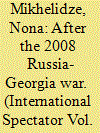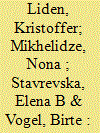|
|
|
Sort Order |
|
|
|
Items / Page
|
|
|
|
|
|
|
| Srl | Item |
| 1 |
ID:
091407


|
|
|
|
|
| Publication |
2009.
|
| Summary/Abstract |
The Georgian-Russian war in August 2008 and Russia's ensuing recognition of South Ossetia's and Abkhazia's independence have generated a new context in relations between the EU, the US and Russia. The crisis created new sources of instability in the entire post-Soviet space, highlighting a new form of Russian revisionism and revealing the limitations of Western policies in what the Kremlin views as its sphere of influence. Caucasian-Central Asian states now wonder whether it is worth complicating their relations with Moscow for the sake of limited or uncertain support from the West. Even if the long-term repercussions of the Russian-Georgian crisis remains unpredictable, one thing is clear: the EU and the US should engage with the region more intensively. In the long run, only economic development in the region, genuine democratisation and real prospects of becoming anchored in Euro-Atlantic structures, alongside effective confidence-building measures between the parties, will be able to induce the secessionist regions to rethink their future.
|
|
|
|
|
|
|
|
|
|
|
|
|
|
|
|
| 2 |
ID:
143797


|
|
|
|
|
| Summary/Abstract |
From a peacebuilding perspective, EU support for civil society organizations (CSOs) in conflict-ridden countries can be criticized for artificially boosting a liberal, ‘bourgeois’ civil society at the expense of more representative initiatives at the grassroots level. Seen from a governance perspective, however, this criticism is lacking in nuance and conceals the actual rationale and effects of the support. To advance a realistic debate on international peacebuilding as a form of governance, this article investigates what the character and effects of EU support for CSOs in conflict-ridden countries actually are: how does it affect the relations between the supported organizations and (1) the wider society, (2) the state and (3) between the recipient country and the EU? We consider four ideal types of EU conflict governance: ‘liberal peace’, ‘hollow hegemony’, ‘vibrant hegemony’ and ‘post-liberal peace’ and compare them to empirical data from Bosnia and Herzegovina, Cyprus and Georgia. We find that while the objectives of promoting peace and democracy through CSO support tend to fail, the strategic interests of the EU are still maintained.
|
|
|
|
|
|
|
|
|
|
|
|
|
|
|
|
| 3 |
ID:
083716


|
|
|
|
|
| Publication |
2008.
|
| Summary/Abstract |
Since the late 1980s, research on political Islam has been much in vogue in Europe and the US. This phenomenon is typically viewed as an expression of religion rather than of politics. Precisely because of the assumed "religious" underpinnings of political Islam, most Western attempts to engage with Islamists often remain trapped in an attempt to test their "democratic credentials". By focussing on what Islamists think about democracy, many studies have ignored the political, social and economic contexts in which Islamists operate. Accounting for the political underpinning of Islamist movements can both help understand their political evolution and open up fruitful avenues for comparative analysis. For this reason, attention is turned to Europe to seek best practices of external engagement with domestic opposition movements in authoritarian contexts, such as Western engagement with opposition actors in Franco's Spain, Kuchma's Ukraine and Shevardnadze's Georgia.
|
|
|
|
|
|
|
|
|
|
|
|
|
|
|
|
|
|
|
|
|